

Category:Guilds. Hanseatic League. The Hanseatic League was a powerful economic and defensive alliance that left a great cultural and architectural heritage.
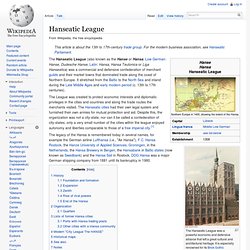
It is especially renowned for its Brick Gothic monuments, such as St. Nikolai and the city hall of Stralsund shown here. Together with Wismar, the old town is a World Heritage Site by UNESCO. Guild. A guild /ɡɪld/ is an association of artisans or merchants who control the practice of their craft in a particular town.
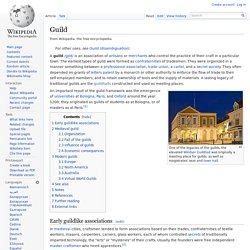
The earliest types of guild were formed as confraternities of tradesmen. They were organized in a manner something between a professional association, trade union, a cartel, and a secret society. They often depended on grants of letters patent by a monarch or other authority to enforce the flow of trade to their self-employed members, and to retain ownership of tools and the supply of materials.
A lasting legacy of traditional guilds are the guildhalls constructed and used as meeting places. Secret society. "Secret Society Buildings at Yale College", by Alice Donlevy[1] ca. 1880.
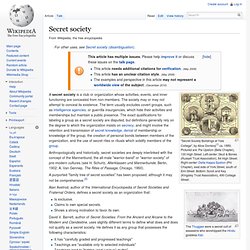
Pictured are: Psi Upsilon (Beta Chapter), 120 High Street. Left center: Skull & Bones (Russell Trust Association), 64 High Street. Right center: Delta Kappa Epsilon (Phi Chapter), east side of York Street, south of Elm Street. Bottom: Scroll and Key (Kingsley Trust Association), 490 College Street. A secret society is a club or organization whose activities, events, and inner functioning are concealed from non-members. Anthropologically and historically, secret societies are deeply interlinked with the concept of the Mannerbund, the all-male "warrior-band" or "warrior-society" of pre-modern cultures (see H.
A purported "family tree of secret societies" has been proposed, although it may not be comprehensive.[2] The Thuggee were a secret cult of assassins who worshipped the Hindu goddess Kali. Is exclusive.Claims to own special secrets.Shows a strong inclination to favor its own. David V. American Mafia. Usage of the term Mafia[edit] The term Mafia was originally used in Italy by the media and law enforcement to describe criminal groups in Sicily.
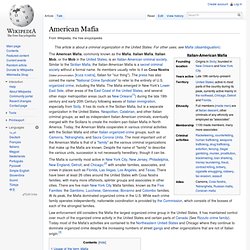
The origins of the term are debatable. Like the Sicilian Mafia, the American Mafia did not use the term "Mafia" to describe itself. Neither group has a formal name and instead used the term Cosa Nostra (Italian for our thing) when referring to themselves. When Italian immigrants started forming organized crime groups in the United States, the American press borrowed the term Mafia from Italy and it became the predominant name used by law enforcement and the public. "Mafia" properly refers to either the Sicilian or American Mafia. History[edit] Origins: The Black Hand[edit] The first published account of what would evolve into the Mafia in the United States came in the spring of 1869.
Prohibition era[edit] Organized crime. 20th century American mobster Al Capone, a figure often associated with the topic of organized crime. Other organizations—including states, militaries, police forces, and corporations—may sometimes use organized crime methods to conduct their business, but their powers derive from their status as formal social institutions. There is a tendency to distinguish organized crime from other forms of crimes, such as, white-collar crime, financial crimes, political crimes, war crime, state crimes and treason. This distinction is not always apparent and the academic debate is ongoing.[3] For example, in failed states that can no longer perform basic functions such as education, security, or governance, usually due to fractious violence or extreme poverty, organised crime, governance and war are often complementary to each other.
Caste. Caste is a form of social stratification characterized by endogamy, hereditary transmission of a lifestyle which often includes an occupation, ritual status in a hierarchy and customary social interaction and exclusion based on cultural notions of purity and pollution.[2][3] According to UNICEF and Human Rights Watch, caste discrimination affects an estimated 250 million people worldwide.[4][5] Etymology[edit] The English word "caste" derives from the Spanish and Portuguese casta, which the Oxford English Dictionary quotes John Minsheu's Spanish dictionary (1599) to mean, "race, lineage, or breed.
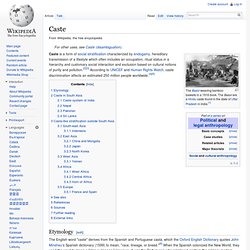
"[6] When the Spanish colonized the New World, they used the word to mean a "clan or lineage. " Caste in South Asia[edit] Caste system of India[edit] An early 20th century ethnographic photograph of men and women from the Kurmi caste—famed as cultivators and market gardeners[8]—sowing their field.[9] Independent India has witnessed caste-related violence. Cartel. One can distinguish private cartels from public cartels.
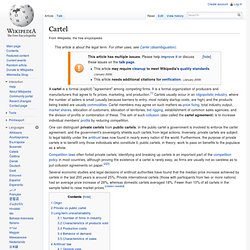
In the public cartel a government is involved to enforce the cartel agreement, and the government's sovereignty shields such cartels from legal actions. Inversely, private cartels are subject to legal liability under the antitrust laws now found in nearly every nation of the world. Furthermore, the purpose of private cartels is to benefit only those individuals who constitute it, public cartels, in theory, work to pass on benefits to the populace as a whole. Competition laws often forbid private cartels.
Identifying and breaking up cartels is an important part of the competition policy in most countries, although proving the existence of a cartel is rarely easy, as firms are usually not so careless as to put collusion agreements on paper.[2][3]